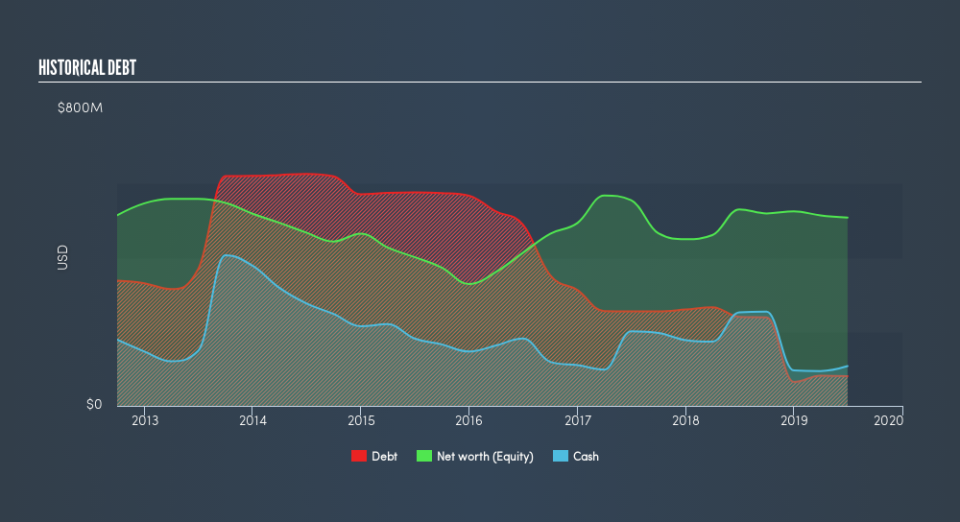Is Clean Energy Fuels (NASDAQ:CLNE) Weighed On By Its Debt Load?

Howard Marks put it nicely when he said that, rather than worrying about share price volatility, 'The possibility of permanent loss is the risk I worry about... and every practical investor I know worries about.' So it seems the smart money knows that debt - which is usually involved in bankruptcies - is a very important factor, when you assess how risky a company is. We can see that Clean Energy Fuels Corp. (NASDAQ:CLNE) does use debt in its business. But is this debt a concern to shareholders?
What Risk Does Debt Bring?
Debt and other liabilities become risky for a business when it cannot easily fulfill those obligations, either with free cash flow or by raising capital at an attractive price. In the worst case scenario, a company can go bankrupt if it cannot pay its creditors. While that is not too common, we often do see indebted companies permanently diluting shareholders because lenders force them to raise capital at a distressed price. Of course, plenty of companies use debt to fund growth, without any negative consequences. When we think about a company's use of debt, we first look at cash and debt together.
View our latest analysis for Clean Energy Fuels
What Is Clean Energy Fuels's Debt?
You can click the graphic below for the historical numbers, but it shows that Clean Energy Fuels had US$80.5m of debt in June 2019, down from US$239.9m, one year before. But it also has US$107.5m in cash to offset that, meaning it has US$27.0m net cash.
How Strong Is Clean Energy Fuels's Balance Sheet?
According to the last reported balance sheet, Clean Energy Fuels had liabilities of US$123.4m due within 12 months, and liabilities of US$63.3m due beyond 12 months. Offsetting these obligations, it had cash of US$107.5m as well as receivables valued at US$70.9m due within 12 months. So its liabilities outweigh the sum of its cash and (near-term) receivables by US$8.41m.
Since publicly traded Clean Energy Fuels shares are worth a total of US$411.5m, it seems unlikely that this level of liabilities would be a major threat. Having said that, it's clear that we should continue to monitor its balance sheet, lest it change for the worse. While it does have liabilities worth noting, Clean Energy Fuels also has more cash than debt, so we're pretty confident it can manage its debt safely. There's no doubt that we learn most about debt from the balance sheet. But it is future earnings, more than anything, that will determine Clean Energy Fuels's ability to maintain a healthy balance sheet going forward. So if you're focused on the future you can check out this free report showing analyst profit forecasts.
In the last year Clean Energy Fuels actually shrunk its revenue by 5.9%, to US$324m. That's not what we would hope to see.
So How Risky Is Clean Energy Fuels?
Although Clean Energy Fuels had negative earnings before interest and tax (EBIT) over the last twelve months, it generated positive free cash flow of US$665k. So although it is loss-making, it doesn't seem to have too much near-term balance sheet risk, keeping in mind the net cash. With revenue growth uninspiring, we'd really need to see some positive EBIT before mustering much enthusiasm for this business. When we look at a riskier company, we like to check how their profits (or losses) are trending over time. Today, we're providing readers this interactive graph showing how Clean Energy Fuels's profit, revenue, and operating cashflow have changed over the last few years.
Of course, if you're the type of investor who prefers buying stocks without the burden of debt, then don't hesitate to discover our exclusive list of net cash growth stocks, today.
We aim to bring you long-term focused research analysis driven by fundamental data. Note that our analysis may not factor in the latest price-sensitive company announcements or qualitative material.
If you spot an error that warrants correction, please contact the editor at editorial-team@simplywallst.com. This article by Simply Wall St is general in nature. It does not constitute a recommendation to buy or sell any stock, and does not take account of your objectives, or your financial situation. Simply Wall St has no position in the stocks mentioned. Thank you for reading.


